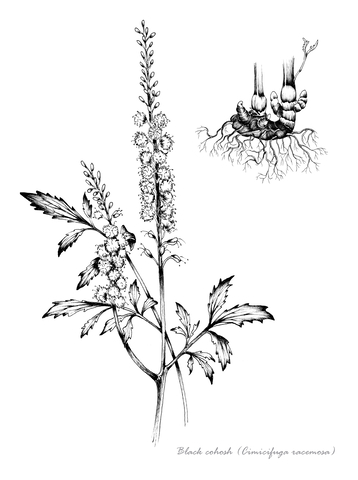Black Cohosh Root

Also known as Cimicifuga racemosa, Actaea macrotys, Actaea racemosa, Baneberry, Black Snakeroot, Bugbane, Bugwort, Phytoestrogen, Rattle Root, Rattle Snakeroot, Rattlesnake Root, Rattleweed, Squawroot. Do not confuse with the potentially toxic blue cohosh.
Introduction Black cohosh is a graceful woodland plant bearing spikes of white flowers, native to New England and eastern Canada. Native Americans have used the herb to treat snakebite and joint problems, but primarily used the herb for women's health. The name cohosh is from the Algonquian tribe, and means rough, referring to the feel of the rhizome. Settlers adopted the herb for the same purposes, and in the late 1800's it became the key ingredient in Lydia Pinkham's "Vegetable Compound", a wildly popular over the counter medicine for menstrual problems, infertility, and unpleasant symptoms of menopause. Lydia Pinkham's "Vegetable Compound" continued to be sold in the latter half of the twentieth century. It was given the name "bugbane" because the flowers have such a strong odor, and have been used to effectively repel insects. Today, black cohosh remains one of the most popular remedies in the world for women's natural health.
Constituents Actein, cimicifugin, formononetin, salicylic acid, tannins, vitamin C.
Parts Used Root.
Typical Preparations Finely chopped, dried root in tablets, teas, or tinctures.
Summary Black cohosh is a popular remedy for hot flashes, mood swings, and vaginal dryness of menopause. The herb does not stimulate the production of estrogen, but it may compensate for low or highly variable levels of estrogen during menstruation or in the menopause. In one well-designed study, 62 women going through menopause received black cohosh, estrogen, or a placebo for 90 days. Women who took black cohosh had the same reduction in hot flashes as women taking estrogen. Black cohosh did not stimulate growth of cells in the uterus, suggesting that, unlike estrogen, the herb does not increase the risk of uterine cancer. Black cohosh also increased the thickness of the vaginal wall. The study also suggested that black cohosh could help prevent osteoporosis.
Precautions In menopausal women, black cohosh is not likely to cause any complications other than mild stomach upset. Black cohosh must be avoided during pregnancy because of its potential ability to stimulate uterine contractions. The safety of black cohosh in breastfeeding mothers and the degree of transmission of black cohosh in breast milk has not been established. There is controversy regarding the safety of black cohosh in women with a personal history or strong family history of breast cancer.
PURCHASE BLACK COHOSH ROOT EXTRACT
For educational purposes only. This information has not been evaluated by the Food and Drug Administration. This information is not intended to diagnose, treat, cure, or prevent any disease.
This information courtesy of MOUNTAIN ROSE HERBS, with full, written permission for reuse. For further traditional information concerning Black cohosh, please visit this excellent resource from Botanical.com. Used with full, written permission.







